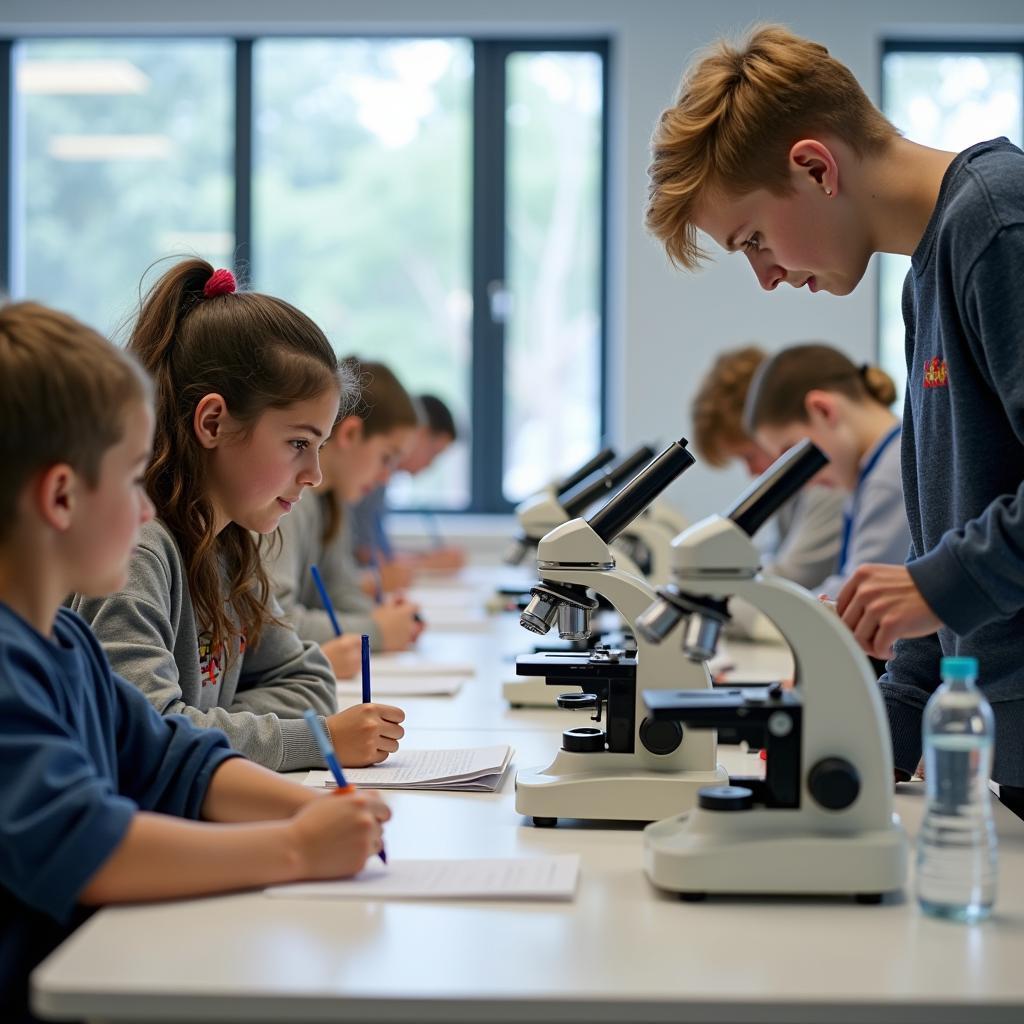Early science education is a frequently tested topic in IELTS Writing Task 2, appearing approximately 2-3 times per year across different variations. This trend suggests its continued relevance in future tests, similar to how the role of music education in personal development has maintained consistent appearance in exams.
Nội dung bài viết
Analysis of Task and Sample Question
Some people think that children should begin learning scientific subjects from a very early age. Others believe it is more important to focus on basic literacy and numeracy skills. Discuss both views and give your opinion.
Task Analysis
- Topic: Early science education vs basic skills
- Task type: Discussion + Opinion
- Key requirements:
- Discuss both perspectives
- Provide personal view
- Support with relevant examples
Band 9 Sample Essay
Just as importance of physical education in combating childhood obesity remains crucial, the debate about prioritizing science education in early years has gained significant attention. While some advocate for early introduction to scientific subjects, others emphasize mastering fundamental skills first. In my view, while both approaches have merit, integrating basic science education alongside core skills offers the most comprehensive foundation for young learners.
Those supporting early science education argue that it develops critical thinking and curiosity at a crucial developmental stage. Children naturally possess an inquiring mind, and exposure to scientific concepts can nurture this innate curiosity. For instance, simple experiments with water properties or plant growth can help children understand cause-and-effect relationships while making learning engaging and meaningful.
However, proponents of focusing on basic skills contend that reading, writing, and mathematical abilities form the foundation for all future learning. Without these fundamental tools, children may struggle to grasp more complex scientific concepts later. They argue that mastering these core competencies should take precedence, as they are essential for daily life and further academic pursuits.

In my assessment, these approaches need not be mutually exclusive. Modern pedagogical methods can effectively integrate scientific thinking into basic skill development. For example, reading comprehension can be enhanced through science-themed stories, while mathematical concepts can be taught through simple scientific measurements and observations. This integrated approach, similar to how role of education in addressing climate change combines multiple disciplines, provides a more holistic educational experience.
Therefore, I believe the optimal solution lies in finding a balanced approach that incorporates both elements. By carefully designing curriculum that weaves scientific concepts into fundamental skill development, educators can nurture well-rounded learners equipped for future academic challenges.
Band 7 Sample Essay
Some people believe children should start learning science from an early age, while others think basic reading, writing, and math skills are more important. I think both views have valid points, but a combination of both approaches would be most beneficial.
Early science education has several advantages. First, it helps children develop logical thinking skills. When young students learn about basic scientific concepts like weather or simple machines, they begin to understand how things work around them. Second, early exposure to science can spark interest in STEM subjects, potentially leading to future career opportunities.
On the other hand, focusing on basic literacy and numeracy is crucial. Children need strong reading and math skills to function in daily life. These skills are also necessary for learning more advanced subjects later, including science. For example, students cannot understand scientific texts or perform calculations without good reading and math abilities.
I believe the best approach is to teach both simultaneously. Simple scientific experiments can actually help improve reading and math skills. When students read instructions for experiments or measure ingredients, they practice both basic and scientific skills together. This method makes learning more interesting and practical.
Key Vocabulary
- pedagogical (adj) /ˌpedəˈɡɒdʒɪkl/ – relating to teaching methods
- holistic (adj) /həˈlɪstɪk/ – considering the whole rather than parts
- mutually exclusive (phrase) /ˈmjuːtʃuəli ɪkˈskluːsɪv/ – cannot occur together
- comprehension (n) /ˌkɒmprɪˈhenʃn/ – understanding
- fundamental (adj) /ˌfʌndəˈmentl/ – forming a necessary base or core
Conclusion
The integration of early science education with fundamental skills represents a significant trend in educational discourse. For practice, consider writing essays on related topics such as:
- The role of technology in early education
- Balance between practical and theoretical learning in primary education
- Impact of hands-on learning experiences in child development
Share your practice essays in the comments section for feedback and discussion.